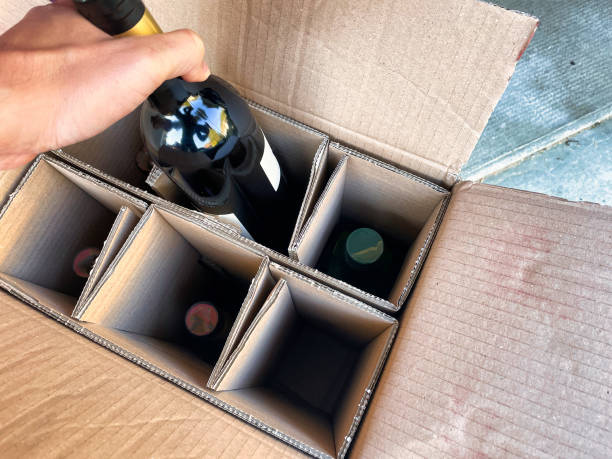Raise your glass to a new way of shopping for wine. Online shopping is a convenient way for consumers to browse and buy rose wine online without leaving their homes.
The best online wine stores offer a simple navigation system and helpful filters that make it easy to find what you’re looking for. They also feature high-quality images and detailed descriptions.

Shopify
Selling wine online can be a lucrative and rewarding business venture. With the right strategy in place, a winery or vineyard can create an attractive and user-friendly website, manage inventory and shipping, promote and market their wines and establish a reliable customer base. To achieve success, retailers should adhere to the best practices outlined in this guide, including creating high-quality images and descriptions of their products, using social media and influencer collaborations to promote their wine brands, and providing excellent customer service.
Shopify is a powerful ecommerce platform that offers a variety of features to help wineries and vineyards sell their products online. The platform also allows for easy integration with third-party apps to enhance and streamline the ecommerce experience. In addition, wineries and vineyards should make sure that their websites comply with the applicable laws and regulations, such as those regarding age verification and shipping.
UK-based Plonk works with independent winemakers to deliver a curated selection of artisanal wines to their subscribers each month. They use their Shopify store to showcase their wines and share their story, as well as provide a seamless subscription experience. They offer customers the option to customize their delivery schedule and select between two, three or six bottles of wine each month. They also offer exclusive perks for their subscriber base, such as VIP event invitations and surprise gifts.
Create Product Listings and Descriptions
Selling wine through ecommerce is an exciting way to reach new customers and increase brand loyalty. It allows buyers to become a part of your story and creates a fun unboxing experience with their purchase. However, finding success as an online ecommerce wine business can be challenging. Many factors must come together in order to convert sales, including a high-quality product, optimized website, and an efficient fulfillment process.
The first step in making your online wine store a success is to create compelling and informative product listings and descriptions. Make sure your product descriptions include detailed information about your wines, such as their origin and production process, flavor profile, and ratings. Creating engaging content that captures your wine products’ unique features and benefits will help your customers choose your products over competitors.
Choosing the right ecommerce platform is another important factor in driving online wine sales. Look for a platform that offers easy-to-use shopping carts, mobile-friendly templates, and SEO optimization capabilities. Additionally, you should consider a platform that allows you to easily manage your inventory and shipping processes.
For example, VinoShipper is an all-in-one compliance and ecommerce solution that lets wine brands sell directly to consumers in all 50 states. It takes care of the legal complexities of selling wine, collects and reports state-specific sales tax, provides third-party age verification for all shipping orders, and tracks and records every sale. It does charge a fee for each shipment, but it can save you time and resources while still allowing you to sell your wine directly to consumers.

Optimize Your Website for Mobile
Online wine sales are surging, presenting an intriguing opportunity for businesses in the beverage industry. However, leveraging this new channel requires an in-depth understanding of what it takes to succeed in the digital world. The right mix of marketing strategies — including social media and content marketing, email personalization, and loyalty programs — can help to boost visibility and build customer trust.
Another important consideration is optimizing your website for mobile devices. With the increasing popularity of mobile shopping, it’s crucial to create a user-friendly experience that provides easy navigation and access to detailed information about your wines. For instance, resizing clickable elements like buttons and hyperlinks makes it easier to tap on touchscreen devices. Shortening forms and reducing load times also makes it easier for customers to complete transactions.
Moreover, incorporating a clear return policy and shipping costs into your online purchase process helps to eliminate uncertainties. This fosters customer confidence and encourages repeat purchases. Additionally, providing transparency ensures a smooth transaction that supports your brand’s image as a trusted retailer.
In addition, consider offering flexible wine club tiers and subscription models to meet various consumer preferences. This will allow your business to capture valuable customer data and curate offerings based on evolving tastes. Moreover, it can also reduce your shipping costs while encouraging consumer retention and loyalty.
Build a Reputable Online Store
Online wine shopping is a great convenience for customers, as it allows them to easily browse a wide range of wines and compare prices. However, the quality of a customer’s virtual shopping experience depends on how well a wine merchant manages their inventory, website design, and marketing campaigns. The best online wine retailers have a simple navigation system, attractive visuals, and detailed descriptions that provide customers with a clear picture of the wines they are purchasing.
In addition, many online wine stores offer a convenient ordering process and hassle-free returns policies to increase consumer confidence. These features are especially important to help wineries and merchants establish trust with their consumers and drive more sales.
Laurie Millotte, the founder of Outshinery, a provider of bottle photography and marketing materials for the wine industry, agrees that accurate and high-quality information is crucial to an effective online store. According to her, people make super-quick decisions based on what they see. As a result, if a wine listing or website has outdated or incorrect information, it’s likely that shoppers will leave without making a purchase.
In order to improve the customer experience, wine merchants and wineries should implement strategies that promote their curated selections of local and international wines. They can also host wine education classes and workshops to attract dedicated wine enthusiasts and build brand loyalty. Moreover, they should run targeted advertisements on social media platforms to reach potential buyers and boost their online sales and profitability.